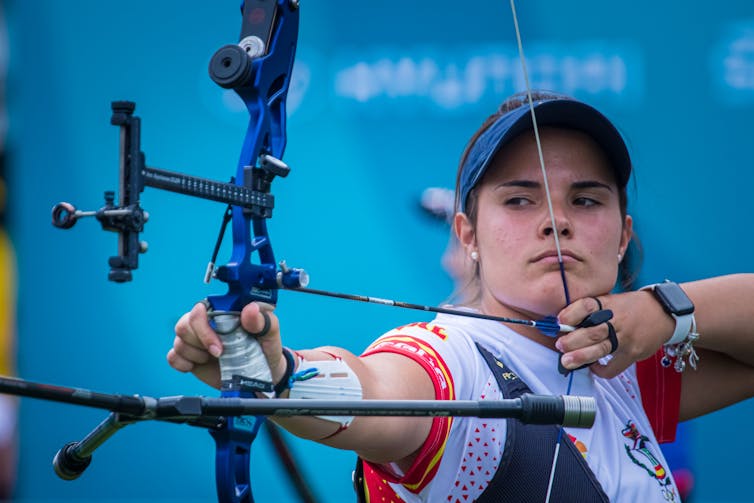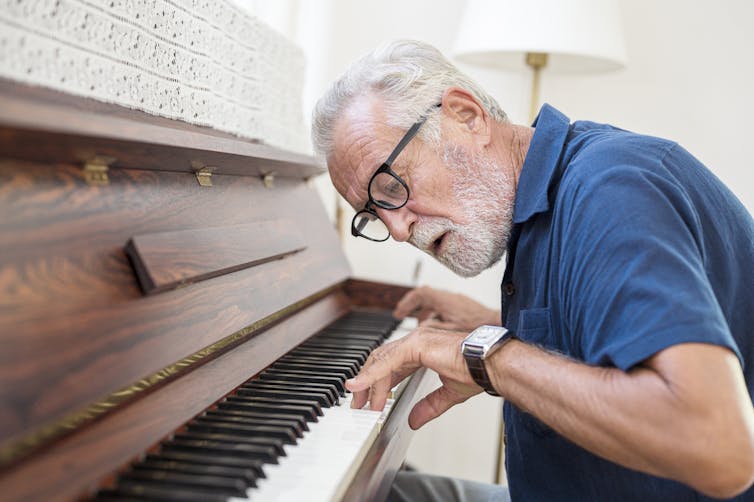Focusing on what you're trying to accomplish rather than what's going on with your body
- Written by Gabriele Wulf, Distinguished Professor, Department of Kinesiology and Nutrition Sciences, University of Nevada, Las Vegas
How do you get to the Olympics? Practice, practice, practice … but also know what to concentrate on during the heat of competition.
How fast someone runs, swims or rows; how high or long they jump; how accurately they hit a target; how well they balance; or how much weight they can lift depends to a significant extent on where they focus their attention.
I’m a sport scientist who for decades has studied how people learn motor skills[1]. In the late 1990s I began examining how a performer’s focus of attention[2] influences learning.
Research suggests that what an athlete concentrates on can be the difference between winning the gold and not even making the team. What might be surprising is that shifting your focus from within yourself – what’s going on in your body – to what’s out there – what you’re trying to accomplish – is a winning strategy.
An athlete’s brain is busy
Consider what the brain needs to do to organize complex movements.
It must coordinate the contractions of the necessary muscles – ensuring that they happen at the right time, for the proper duration, and with the required intensity. It also must inhibit other muscles, basically telling those not involved in the movement to stay on the sidelines for the moment.
Temporary task-specific connections among relevant brain networks are a precondition for smooth, efficient and precise movements. The functional connectivity[3] of certain brain areas and the suppression[4] of other areas enable an athlete to produce elegant jump shots, tennis strokes, golf swings or tumbling routines.
Learning to produce effective brain activation patterns is a long-term process, of course. Achieving a skill level at which performance is consistently accurate, automatic, fluent and economical requires considerable practice. Athletes hone their skills over many years or even decades.
Nevertheless, at the moment they perform, their focus of attention plays a critical role. If athletes have the wrong focus, their performance will suffer.
 Thinking of how the arrow will fly into the target yields better results than thinking about how your hand should grip the bow.
Dean Alberga/Handout/World Archery Federation via Getty Images[5]
Thinking of how the arrow will fly into the target yields better results than thinking about how your hand should grip the bow.
Dean Alberga/Handout/World Archery Federation via Getty Images[5]
Where to target your focus
Based on the findings of numerous studies[6], it’s clear athletes should never concentrate on their own movements – what movement scientists call an internal focus of attention.
This might seem contradictory to the way many people learn a new sport. After all, those who instruct others in the process of acquiring movement skills typically refer to body movements. Think of a coach telling a young basketball player to flick her wrist while shooting the ball, or a golf coach telling a player to focus on his hip rotation. Consequently, athletes think about how to move their body parts, particularly in the early stages of learning.
But surveys have found that even experienced athletes often focus internally[7]. Especially when they’re under pressure – as they would be during competition – they tend to concentrate on their movements. Often, the result is that they “choke.”
Instead, for optimal performance[8], the focus should be on the movement goal. This is called an external focus of attention.
It can mean concentrating on a target to be hit, such as the corner of a goal, a golf hole, a bull’s-eye or a catcher’s mitt. It can also be the intended motion or trajectory of an implement such as a javelin, discus or barbell; the desired spin of a ball; the force exerted against an apparatus or piece of equipment, the floor or an opponent; the water being pushed back in swimming or rowing; or the finish line in a race.
What it is not is the hand releasing the object or pulling the water back, the muscles producing the force, or the speed of leg movements.
More efficient to focus on what than how
Focusing on the intended outcome of your actions, rather than your body movements, reveals the body’s remarkable capability to produce effective and efficient movements. Even movement form[9] or technique[10] often improves immediately when a person switches from an internal to an external focus of attention. The body does what it has to do to complete the action – unless you interfere via conscious attempts to control your movements.
Researchers have noted the effects of an external focus on many aspects of performance: improved movement accuracy[11], enhanced balance[12], greater maximum forces[13], higher speed[14] and better endurance[15].
With an external focus, movements are more efficient. Because brain and muscle activity are optimized, the resulting movements are produced with less energy. This is seen, for example, in reduced oxygen uptake[16] or lower heart rates[17] for the same physical work when performers adopt an external focus.
Researchers have quantified just how much of an edge this focus shift can provide to athletes. With an external focus:
Considering that races are often won or lost by very small margins, sometimes in the range of hundredths of a second, an athlete’s focus of attention can determine whether or not they win a medal.
 Don’t overthink it – let your hands do what they know how to do.
Nitat Termmee/Moment via Getty Images[18]
Don’t overthink it – let your hands do what they know how to do.
Nitat Termmee/Moment via Getty Images[18]
Plenty of benefits beyond Olympic stadium
While most people will never be Olympians, an external focus provides benefits regardless of the performer’s level of expertise, age or (dis)ability, or the type of skill.
[Over 100,000 readers rely on The Conversation’s newsletter to understand the world. Sign up today[19].]
Whether you are learning to play a musical instrument or are an experienced musician[20], an external focus will result in better performance. Whether you are an older adult with Parkinson’s disease[21] or a young healthy adult[22], your balance will be enhanced by an external focus. Whether you are unimpaired[23] or had a stroke[24], you will perform activities of daily living[25] more effectively with an external focus.
It turns out your body can more masterfully execute the actions you desire if you’re able to move your conscious focus from what your body is doing and instead think about what you want to accomplish.
References
- ^ studied how people learn motor skills (scholar.google.com)
- ^ focus of attention (pubmed.ncbi.nlm.nih.gov)
- ^ connectivity (doi.org)
- ^ suppression (doi.org)
- ^ Dean Alberga/Handout/World Archery Federation via Getty Images (www.gettyimages.com)
- ^ findings of numerous studies (doi.org)
- ^ even experienced athletes often focus internally (doi.org)
- ^ optimal performance (doi.org)
- ^ movement form (journals.humankinetics.com)
- ^ technique (www.tandfonline.com)
- ^ accuracy (doi.org)
- ^ balance (rua.ua.es)
- ^ maximum forces (doi.org)
- ^ speed (doi.org)
- ^ endurance (doi.org)
- ^ reduced oxygen uptake (pubmed.ncbi.nlm.nih.gov)
- ^ lower heart rates (psycnet.apa.org)
- ^ Nitat Termmee/Moment via Getty Images (www.gettyimages.com)
- ^ Sign up today (theconversation.com)
- ^ experienced musician (doi.org)
- ^ Parkinson’s disease (doi.org)
- ^ young healthy adult (doi.org)
- ^ unimpaired (doi.org)
- ^ stroke (doi.org)
- ^ activities of daily living (doi.org)

















